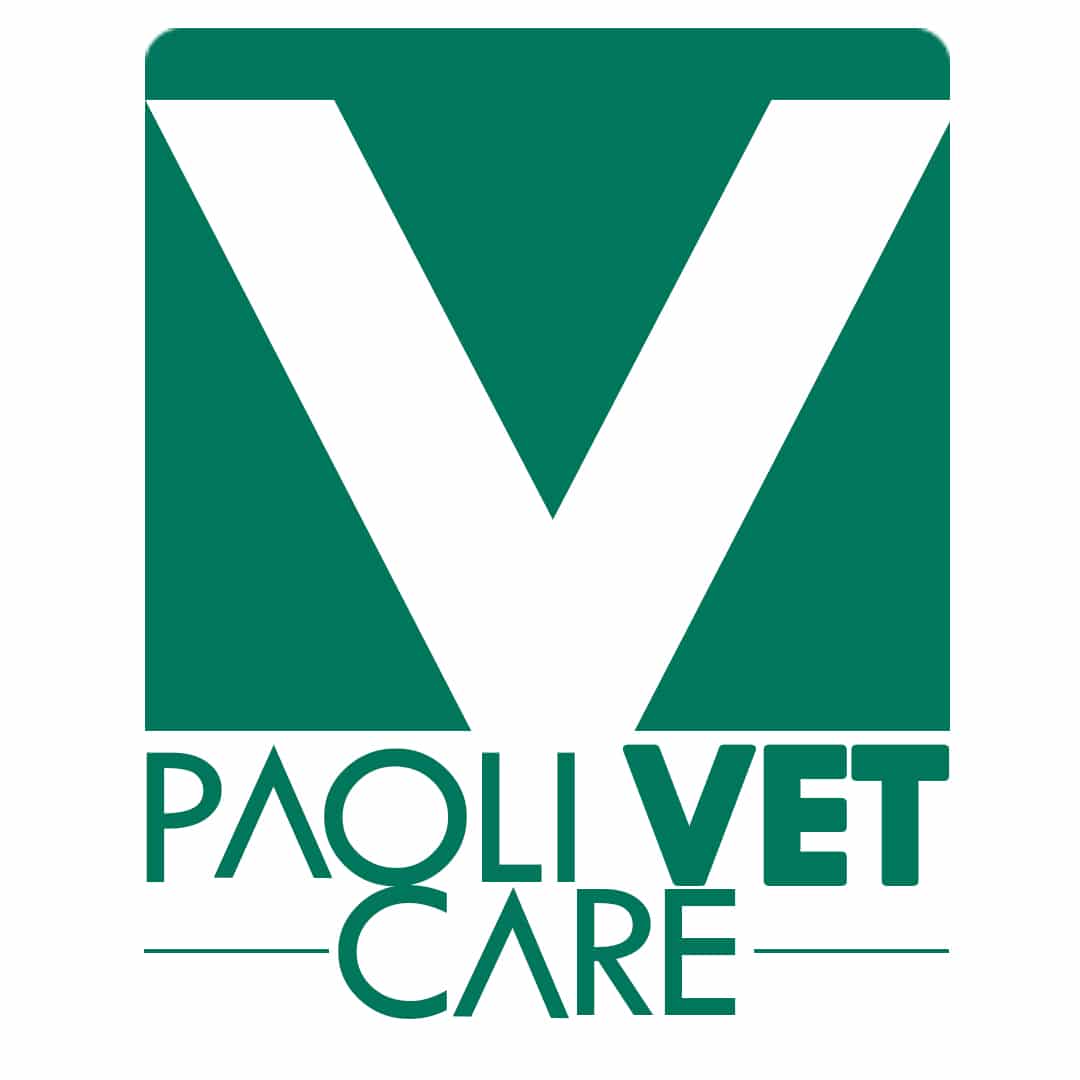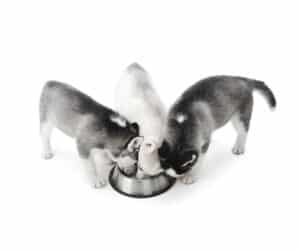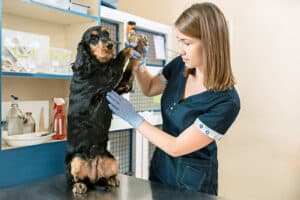What Is Dog Diarrhea?
Table of Contents
Dog diarrhea isn’t something any pet parent wants to deal with. We all have, unfortunately, seen diarrhea before, and in dogs, this is a symptom of other underlying diseases. Dog diarrhea is when their stools are passed loose or liquid in large amounts, and often in large or spontaneous amounts. It’s frustrating, gross, and worrying.
When your dog has diarrhea, you must take them to the veterinarian so that the doctor can find the underlying cause. Prognosis and treatment are crucial as diarrhea can be caused by your dog ingesting something abnormal, or contracting a viral disease.
Regardless of the cause, you need to know how to stop and treat the condition. If your dog has diarrhea, do you rush them to the vet or try and treat the condition at home? What can you do to prevent dog diarrhea in the future? Here’s everything you ever wanted (or didn’t want) to know about dog diarrhea.
Types of Dog Diarrhea
It’s unfortunate, but your veterinarian will want to know all the gross, smelly details about your dog’s diarrhea. It’s important that you know the difference between your dog’s diarrhea types, and we’ve split them into four categories that can better help you and your veterinarian figure out what’s wrong with your precious pet.
Osmotic Diarrhea: This stool movement occurs when water rushes into the GI tract, creating a volume of fluid feces. Lactose intolerance and high-fat meals can cause osmotic diarrhea, categorized by watery bowel movements. Fasting is typically the best way to address this problem.
Secretory Diarrhea: When the GI tract makes too many secretions, typically caused by bacterial toxins or viruses, your dog will experience an abundance of watery feces. Fasting isn’t the cure for secretory diarrhea, and you’ll need to consult with your dog’s veterinarian for treatment.
Exudative Diarrhea: When the GI lining becomes damaged due to ulcerative colitis or certain autoimmune diseases, this type of diarrhea will often occur. Exudative diarrhea can be worrying as there will be blood or mucus in the feces, prompting a quick call to your dog’s veterinarian.
Rapid Intestinal Transit Diarrhea: This one is caused by your dog’s colon squeezing with more intensity, causing the GI tract to push materials through faster than normal. Rapid GI movement causes watery bowel movements and loose feces.
Is Dog Diarrhea an Emergency?
When dog diarrhea is lasting it can be a problem. If your dog experiences diarrhea but seems happy and healthy, you can watch their condition at home until it improves. You should seek veterinary care if the diarrhea doesn’t clear up in 48 hours, or if it occurs more than once within days or weeks. Dog diarrhea can also be an emergency if you notice blood or mucus in their stool.
You should seek veterinary emergency care if your dog:
- has ingested a toxin
- has drank something poisonous
- shows signs of lethargy
- has a fever
- is experiencing belly pain
- is vomiting
- has any abdominal distention
- is a senior or puppy
- has any pre-existing health conditions
In the case of an emergency, call the Animal Poison Control Center.
Causes of Diarrhea
Nobody wants their dog to be in pain. As discussed above, your dog’s loose stool could be a minor event—or a serious condition. Diarrhea can be sudden, beginning acutely and lasting only a day or two. Or it can be chronic, lasting weeks at a time and changing in intensity day by day. The reasons for the diarrhea can be obvious, but the exact cause can be difficult to figure out, requiring attentive care from your pet’s veterinarian. Here are some of the common causes of dog diarrhea, and how to prevent them.

Dietary indiscretion
What has your dog been eating? Digestive upsets can be caused by several things, such as sudden changes in diet, switching to new food, discovering a new food intolerance, or ingesting an allergen.
Dogs love to eat things that they shouldn’t. They’re natural scavengers, and they love to consume prizes such as garbage, table scraps, and animal carcasses. These can lead to digestive upsets, and scavenging for foodstuffs can cause them to ingest toxins, pathogens, and other nasty things. Eating human snacks, chomping on trash, or finding a dead squirrel or possum can be a dietary discretion, and is possibly the most common cause of acute dog diarrhea.
When this happens, their diarrhea should clear up in a day or two and shouldn’t be cause for distress unless you believe your dog has eaten something poisonous, in which case you should take them to their veterinarian right away.
Intestinal Blockages
Intestinal blockages are very dangerous. If you suspect your dog has eaten a toy or another foreign object, take them to their veterinarian immediately. Foreign bodies can be a cause for diarrhea, and blockages in the GI tract are very serious and can interfere with your dog’s internal motility. Digestive tissues can become inflamed, and tissues near the obstruction might stretch, creating loose stool around the blockage.
Stress
Like humans, dogs are affected by stress and anxiety. Stress can be a cause for sudden acute onset diarrhea, because the body reacts to stress by releasing chemicals that disrupt the gut biome. When the microbiome is disrupted, the community of microorganisms in the GI tract can cause bodily problems in various ways. Anything from dehydration, to fireworks, to a recent injury can create these disruptions.
Vigorous Exercise
Dogs love exercise, but even they can be victims of too much of a good thing. Diarrhea caused by over-exercise is typically short-term and not abnormal—while it can still be gross and scary, this diarrhea is caused by muscles working too hard and the body directing blood flow away from the digestive system. This can cause disruptions in the GI tract, creating changes that lead to intestinal distress.
Exercising in hot weather can lead to diarrhea and other issues, as it is easy for dogs to overheat and become dehydrated. Try and avoid excessive play in hot weather or environments.
Parasites and Pathogens
Parasites, such as tapeworms, roundworms, or hookworms, can be a cause of diarrhea. Pathogens and other bacteria will also cause problems in a dog’s GI tract, such as E. coli or Salmonella.
Since you cannot see bacterial pathogens, this cause can be difficult to pinpoint on your own. Some parasites can show up in your dog’s stool as specks or grains, and if you notice this abnormality you should take a sample to your veterinarian so they can screen it for parasites and pathogens. Stay current with your dog’s antiparasitic medications to prevent this type of diarrhea.
Inflammatory Bowel Disease (IBD)
Dog diarrhea can sometimes last for a few weeks or more, continuously or intermittently. If the bouts of diarrhea are accompanied by loss of appetite or vomiting, chronic inflammation of the GI tract might be the culprit. Inflammatory bowel disease or IBD is a chronic inflammation of the digestive tract. This interferes with the ability to process food and absorb nutrients, and can be a significant factor causing your dog’s diarrhea.
IBD is a disruption of the gut microbiome. Bacterial populations can grow too large and take resources away from other bacteria, creating an imbalance in the gut. Beneficial bacteria need space and resources to function, and IBD creates a loss or reduction of your dog’s natural microbiome environment.
While IBD and its causes can be tough to figure out, your veterinarian will offer several treatments, including supplements, microbiota transplants, or diet changes.
Medication Side Effects
Dogs can experience unfortunate medication side effects just like humans can. Diarrhea can be a side effect of various medications, such as antibiotics. When the bacteria in your dog’s gut is killed or disrupted by antibiotics, this imbalance of their gut microbiome and gut flora can cause acute diarrhea. When your veterinarian prescribes an antibiotic to your dog, they will also prescribe antibiotic-associated diarrhea-preventative supplements.
Other Diseases
Various diseases can cause dog diarrhea. Bacterial infections, viral infections, GI tract disruptions, hormonal imbalances, and cancer can all have diarrhea as a side effect. Remember, there are any number of parasites and pathogens that can lead to dog diarrhea, and when your veterinarian is trying to diagnose a case of diarrhea, you must give them as much information as possible.
How Veterinarians Diagnose Dog Diarrhea
Diagnosis and creating a proper treatment plan is the best way to cure your dog of their diarrhea and its root cause. Diagnostics can include a physical exam, blood work, tests, and biopsy to find out the real problem.

- History: Your veterinarian will look through your dog’s detailed history to figure out if anything triggered the diarrhea.
- Physical Exam: A thorough exam will allow your veterinarian to track your dog’s overall health and find any abnormalities.
- Blood Work: A complete blood count and biochemistry profile will allow your veterinarian to detect liver disease, kidney disease, infections, hydration status, and more.
- Fecal Exam: This allows the veterinarian to find internal parasites.
- Parvo Test: Your veterinarian might recommend this test to a puppy or unvaccinated dog to rule out any deadly viral diseases.
- X-rays: Sometimes X-rays will be necessary to find foreign body blockage or internal damage.
- Biopsy: Intestinal biopsies are the best way to diagnose the cause of diarrhea.
- Food Elimination Trial: If a food allergy is suspected, your veterinarian might schedule a food elimination trial to discover which ingredient is causing the issue.
Treatment of Dog Diarrhea
Once the underlying cause is found, your veterinarian can begin treatment. Potential treatments for diarrhea and its causes include:
- Fasting: Withholding food for up to 24 hours can give an inflamed intestine enough time to calm down.
- Fluid Therapy: Replacing lost fluid and correcting an electrolyte imbalance.
- Antibiotics: These are prescribed to clear up or prevent bacterial infections.
- Antiparasitics: If your dog has worms or other intestinal parasites, your veterinarian will prescribe antiparasitics.
- Change in Diet: Food sensitivities and allergies can cause diarrhea, and your veterinarian will recommend a controlled diet to offset their symptoms.
Foods That Can Help Dog Diarrhea
After fasting, it’s important to reintroduce your dog to simple foods that will act as “binders” to help normalize stool consistency. The best foods for pets with sensitive stomachs include:
- Boiled high-quality white rice
- Plain, cooked white rice with a splash of unsalted chicken broth
- Canned pumpkin puree
- Shelf-stable pumpkin powder
- Plain yogurt with active cultures
- Boiled, skinless potatoes
- Low-sodium, low-fat plain cottage cheese
- Plain eggs or skinless chicken
Your veterinarian can help recommend safe, gut-healthy foods for your dogs after an acute or chronic diarrhea event.
Prevention of Dog Diarrhea
While not every diarrhea event can be prevented, there are a few things you can do to lower your dog’s risk of diarrhea. Dog diarrhea prevention can include:
- Updating your dog’s vaccinations
- Switching your dog’s diet gradually
- Utilizing year-round parasite prevention medications
- Keep your garbage containers sealed
- Keep your dog away from fecal matter
- Don’t allow your dog to drink from public water sources
- Avoid toxic ingredients
- Keep your house clean and tidy
- Don’t feed your dog table scraps
- Keep your dog’s stress at a manageable level
What Else Is Your Dog’s Poop Telling You?
There are useful clues in your dog’s poop, if you know how to look. While normality depends on diet, age, and more, a healthy dog’s poop should generally be a medium brown color, not too hard or soft. Density, dryness, and color can change based on diet and age, and if you’re concerned about any changes you should bring them up with your veterinarian. They can provide you with additional information including a dog poop color chart that can help you track your pet’s stool movements, especially if you are concerned that they ingested something they shouldn’t have.
Conclusion
Dog diarrhea is a messy business. We’ve covered causes, treatments, and advice, but there is no better route for pet concern than discussing the problem with your dog’s trusted veterinarian. Contacting a knowledgeable vet, such as those at Paoli Vetcare, is the best way to ensure your dog is happy, healthy, and active.
Whether you have general concerns over your dog’s bowel movements or there’s a sudden emergency, Paoli Vetcare has decades of experience caring for our furry friends. Reach out to Paoli Vetcare today to schedule your dog’s next veterinary appointment and learn more about what you can do to prevent and treat dog diarrhea.








